Big data tools are evolving and adapting to meet the needs of organizations. Currently, the focus is on cloud-based solutions with easy access to powerful computing resources. Furthermore, with the rise of IoT devices, there's an increasing need for real-time data processing.
With these and other trends in mind, find here a comparison of the best big data tools and their applications to help you find the one for you.
Let's take a look at the summary table!
| Tool | Best for | Pricing |
|---|---|---|
| ZenRows | Extracting data from the web | 1,000 free API credits and paid plans starting at $49/mo |
| Tableau | Rendering data in a visual format | 14-day free trial and paid options from $70/mo per user |
| Qualtrics CoreXM | Processing business-related data into user-friendly output | Free limited account and undisclosed pricing |
| RapidMiner | Using computer science methods to process data | Limited free version and customized plans for enterprises |
| MongoDB | Processing and combining data from multiple sources | The open-source edition is free, while the paid version starts at $57/mo |
| Zoho Analytics | Collecting and processing data to improve decision-making processes | 15-day free trial and plans starting at $26/mo |
| Cloudera | Covering a wide array of functions like data storage, analysis, and distribution | 60-day free trial of the Public Cloud and customized pricing |
| Adverity | Improving governance workflows and processes | 14-day free trial and plans starting at $500/mo |
| Dataddo | Optimizing cloud-based workflows | 14-day free trial and plans starting at $199/mo |
| Pentaho | Identifying patterns and trends in data gathered from multiple sources | Free open-source Community Edition and undisclosed pricing for the Enterprise Edition |
| KNIME | Converting unstructured data into a usable format | Free for individuals and undisclosed pricing for teams |
| Integrate.io | Creating and managing data pipelines | Free trial and yearly plans starting at $15,000 |
| TIBCO Clarity | Identifying and correcting raw data | 30-day free trial and plans starting from $100/mo per user |
| Apache Flume | Automating data collection and transfer | Free to use |
| CARTO | Acquiring, analyzing, and visualizing geographic data | 14-day free trial and plans starting at $199/mo per user |
| Talend | Optimizing data pre-processing step | Free trial and undisclosed pricing plans |
| Apache Hadoop | Storing data for analysis | Free to use |
| Clearbit | Gaining insights from an existing database | Free API credits and customized pricing plans. |
| Apache Airflow | Updating and transforming data | Free to use |
| Oracle | Creating and implementing SQL queries | Undisclosed pricing |
What Are Big Data Tools?
Big data tools are software applications and frameworks designed to process complex data sets in an efficient, cost-effective, and scalable way. They help organizations extract insights to improve the decision-making process.
These tools have several different types depending on the purpose they serve. Some examples include:
- Extraction.
- Storage.
- Processing.
- Management
- Integration.
- Visualization.
- Querying.
Now, let's review the best options in these and other categories.
Best Big Data Tools
Below, you'll find the best big data tools. Let's take a look!
ZenRows: Best Big Data Extraction Tool
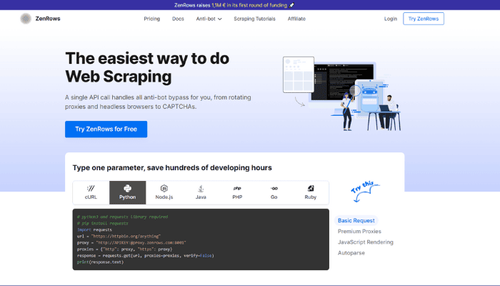
ZenRows is a web scraping API that allows developers to extract data from websites without writing complex code or managing servers. Its advanced anti-bot bypass features ensure the success of the requests. Users get the returned data in HTML, or in JSON for some popular sites.
👍 Pros:
- Easy setup.
- It works with any programming language.
- Customizable requests using CSS selectors.
- Cloud-based infrastructure.
👎 Cons:
- No ready-to-use integration with third parties.
💰 Pricing:
- 1,000 free API credits.
- Plans start at $49/mo.
Tableau: Best Data Visualization Tool
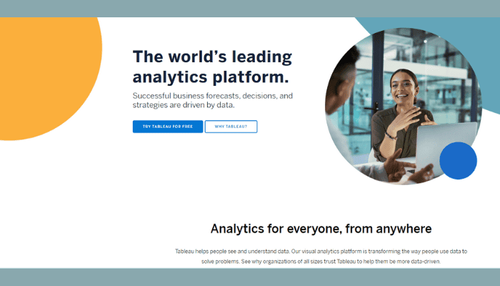
Tableau is a powerful data visualization and business intelligence software. You can use it to create intuitive and insightful graphs, charts, and reports. Its user-friendly interface and drag-and-drop functionality ease data use from various sources. A highly recommended big data tool.
👍 Pros:
- Custom dashboards and visualizations.
- Advanced analytics.
- Huge online community.
- Enterprise-level security.
👎 Cons:
- Some functions take time to learn.
- Costly for smaller organizations.
💰 Pricing:
- 14-day free trial.
- Plans start at $70/mo per user.
Qualtrics CoreXM: Best Business Intelligence Tool
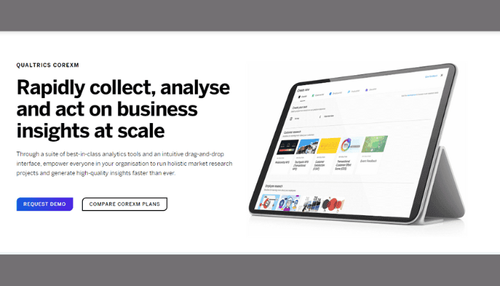
Qualtrics CoreXM is a powerful research platform and business intelligence tool designed for a specific purpose: it helps organizations make-data driven decisions based on the insights gathered from surveys. It comes with diverse analytics, visualization, integration, and collaboration tools to make the processes easy and accessible.
👍 Pros:
- Wide range of question types.
- Advanced survey features.
- Customizable reporting options.
- Data security features.
👎 Cons:
- The advanced features require technical experience.
💰 Pricing:
- Free account with limited functionality.
- Undisclosed pricing.
RapidMiner: Best Data Mining Tool
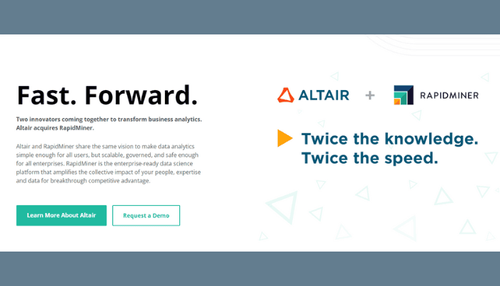
RapidMiner is a low-code platform with a wide range of features, covering all steps from data mining to model deployment. Its drag-and-drop Graphical User Interface makes building custom models for predictive analysis quick and intuitive.
👍 Pros:
- Rich set of Machine Learning algorithms for data mining.
- Integrations with various databases, CSV files, APIs, plugins, and Excel spreadsheets.
- Interactive visualizations.
- Easy and quick learning curve.
👎 Cons:
- Relatively slow processing speeds.
- Limited data visualization options.
💰 Pricing:
- Limited free version.
- Custom paid plans for enterprises.
MongoDB: Best Data Aggregation Tool
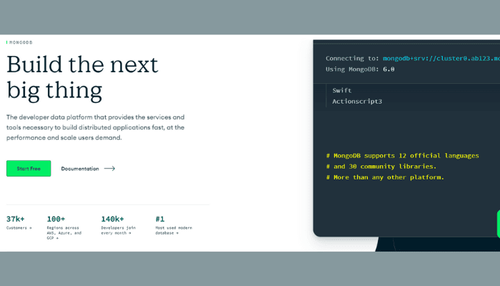
MongoDB is an open-source NoSQL database system that stores, manages, and retrieves data in a collection of dynamic JSON-like documents. It provides support for complex querying, join operations and aggregation capabilities.
However, larger companies will require the paid Enterprise Advanced Server edition.
👍 Pros:
- Flexible data storing without predefined rigid schema.
- Multiple indexes support.
- Features that allow high scalability.
- Advanced security features.
👎 Cons:
- Complicated joining of documents.
- It doesn't support transactions.
💰 Pricing:
- The Community Server edition is free and open-source.
- The Atlas edition starts at $57/mo.
Zoho Analytics: Best Data Analysis Tool
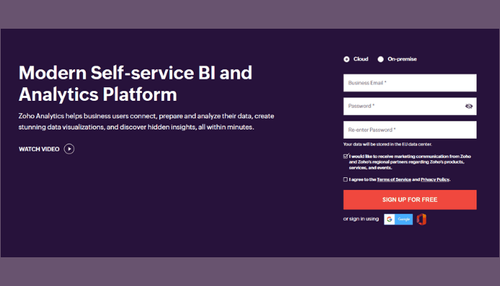
Zoho Analytics is a platform that helps users collect, analyze, and visualize data from multiple sources, like spreadsheets, databases, applications, etc. With its drag-and-drop interface, you can easily create interactive dashboards and reports and share them with your team.
👍 Pros:
- Advanced features like data blending, predictive analysis, and natural language processing.
- Customizable charts, filters, and drill-down capabilities.
- Cloud-based workflow.
- Reliable security features.
👎 Cons:
- Insufficient learning resources.
- Limited visualization options.
💰 Pricing:
- 15-day free trial.
- Plans start at $26/mo.
Cloudera: Best Big Data Management Tool
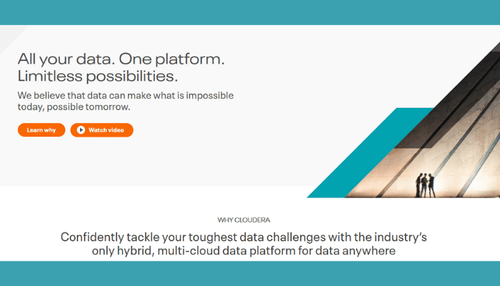
Cloudera is an enterprise-grade platform for big data management that enables organizations to store, process, and analyze large amounts of data in real time. Its unified interface allows users to track and secure data across all environments effortlessly.
👍 Pros:
- Part of a large Haddop-based ecosystem.
- Quick processing of large data volumes.
- Regular updates to fix bugs and enhance features.
- Clean and easy-to-navigate interface.
👎 Cons:
- Difficult initial setup.
- Expensive plans.
💰 Pricing:
- CDP Public Cloud offers a 60-day free trial.
- Flexible hourly rates and custom plans.
Adverity: Best Big Data Governance Tool
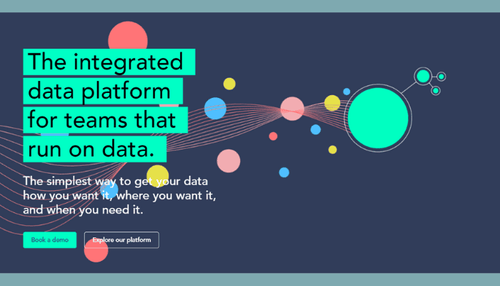
Adverity is a data governance platform allowing businesses to unify data from multiple sources and extract valuable insights. It's highly customizable, with diverse options to process and visualize data. It supports imports from a wide range of sources, like social media platforms, web analytics tools, etc.
👍 Pros:
- Variety of visualization tools.
- Numerous integrations.
- Reliable customer service.
- Custom solutions to fit personal needs.
👎 Cons:
- Data processing can be slow.
💰 Pricing:
- 14-day free trial.
- Plans start at $500/mo.
Dataddo: Best Big Data Cloud Tool
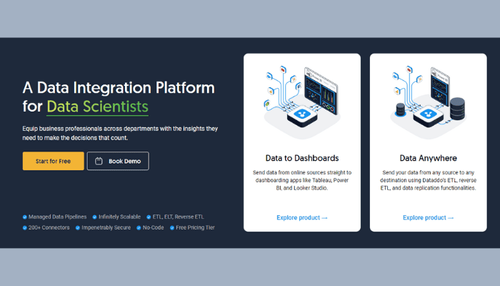
Dataddo is a cloud-based data integration platform allowing quick and easy extraction, analysis, and visualization. It has a user-friendly interface and a wide set of advanced data automation and management features, suitable for businesses of all sizes.
👍 Pros:
- Vast range of data extraction sources.
- Comprehensive security features.
- Easy setup and learning curve.
- Efficient customer support.
👎 Cons:
- Difficult subscription cancellation.
- Troubles with custom fields.
💰 Pricing:
- 14-day free trial.
- Plans start at $199/mo.
Pentaho: Best Data Discovery Tool
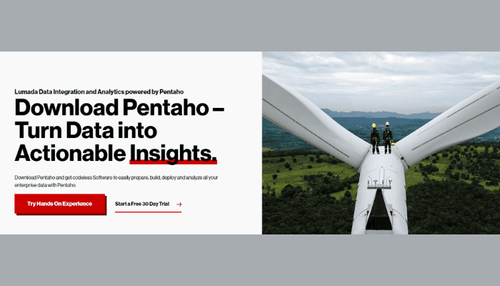
Pentaho is a business intelligence software suite focused on data discovery and management. It provides a comprehensive set of data integration tools and powerful analytic capabilities. It's flexible and customizable so that it can be adapted to any organization's needs.
👍 Pros:
- Multi-user support.
- Wide range of reporting options.
- Highly scalable and easy to use.
- Reliable technical support.
👎 Cons:
- Lacking interface design.
- Difficult-to-solve bugs.
💰 Pricing:
- Free and open-source Community Edition.
- Undisclosed pricing for the Enterprise Edition.
KNIME: Best Big Data Database Tool
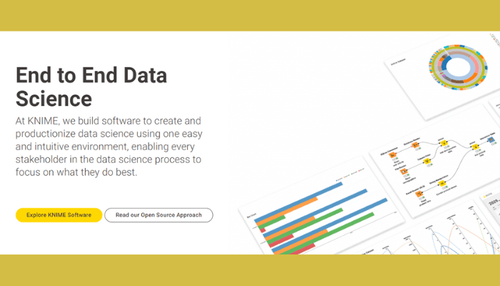
KNIME is an open-source data analytics platform to manipulate, analyze, and visualize data. It has a visual programming environment with a drag-and-drop interface to create workflows composed of nodes. The nodes can represent any data processing operation and can be easily connected.
👍 Pros:
- It combines structured and unstructured data sources.
- Built-in and customizable nodes.
- It works with Java, Python, R, and other programming languages.
- Large and active community.
👎 Cons:
- Limited statistical and visualization capabilities.
- Resource intensive and slow at times.
💰 Pricing:
- Free for individuals.
- Undisclosed prices for teams.
Integrate.io: Best Data Pipeline Tool
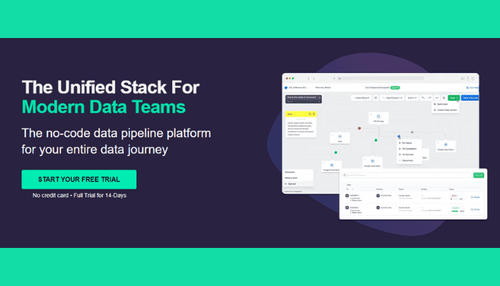
Integrate.io is a no-code platform that offers a comprehensive data pipeline tool. It automates data integration and streamlines data movement between different systems and applications. It supports diverse data source types and custom integrations.
👍 Pros:
- Powerful data orchestration capabilities.
- Advanced security and governance features.
- Data mapping and transformation tools.
- User-friendly drag-and-drop interface.
👎 Cons:
- Limited data visualization options.
- Long waiting times for customer support.
💰 Pricing:
- Free trial.
- Paid plans start at 15,000/year.
TIBCO Clarity: Best Data Cleaning Tool
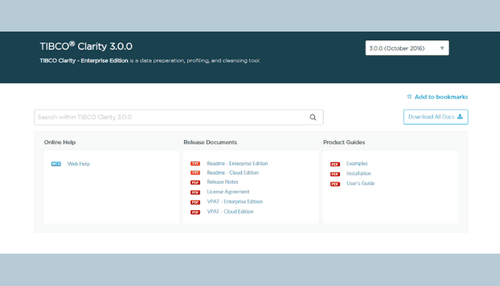
TIBCO Clarity provides powerful data cleaning and quality management capabilities to help organizations ensure data accuracy and consistency. It allows for easy integrations with multiple sources and has efficient data analysis and visualization features.
👍 Pros:
- Easy-to-use interface.
- Automation capabilities.
- Integrations with other TIBCO products.
- Expensive, especially for smaller businesses.
👎 Cons:
- Steep learning curve.
- Significant resource requirements.
💰 Pricing:
- 30-day free trial.
- Plans start at $100/mo for one user.
Apache Flume: Best Big Data Ingestion Tool
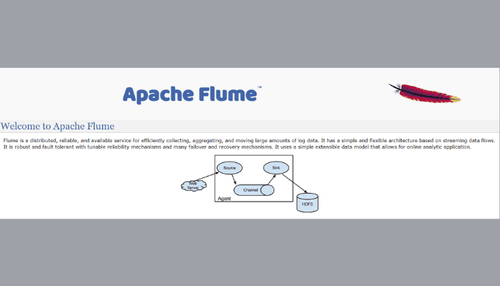
Apache Flume is an open-source service for collecting, aggregating, and moving large amounts of data to centralized data stores. It has a flexible architecture that allows it to be customized and scaled to fit any organization's needs.
👍 Pros:
- Reliable and fault-free data delivery.
- Real-time data processing.
- Other big data tools integrations.
- Support for various data sources and sinks.
👎 Cons:
- Steep learning curve.
- High resource consumption.
💰 Pricing:
- Free to use.
CARTO: Best Geospatial Data Tool
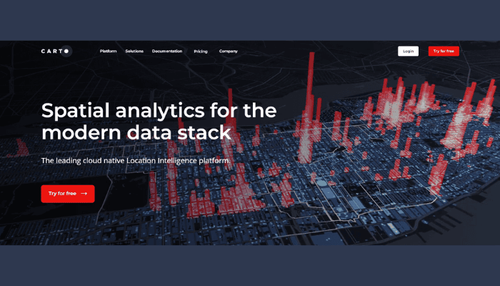
CARTO is a cloud-based platform for data visualization and spatial analysis. It allows users to create interactive maps, dashboards, and location-based applications with no code. Its advanced built-in tools and algorithms for spatial analysis include heat maps, point clustering, and spatial joins.
👍 Pros:
- Custom spatial analysis using SQL.
- Vast visualizations customizations options.
- Variety of mapping styles.
- User-friendly interface.
👎 Cons:
- Limited offline functionality.
- The platform's functionality largely depends on the data quality and quantity.
💰 Pricing:
- 14-day free trial.
- Plans start at $199/mo for one user.
Talend: Best Data Curation Tool
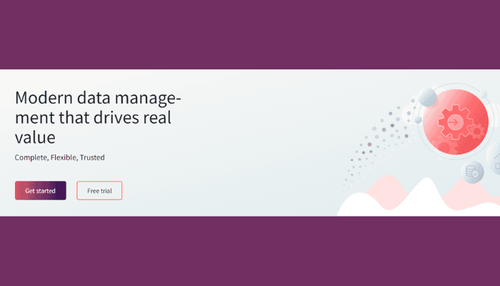
Talend is a data management platform with excellent data curation capabilities. That includes data profiling, cleansing, and enrichment to ensure the end result is accurate, complete, and relevant for the intended use. That can lead to better decision-making and operational efficiency.
👍 Pros:
- Diverse integration capabilities.
- Support for various sources.
- Robust range of tools for data quality management.
- Flexibility and scalability to meet any organization's needs.
👎 Cons:
- Resource intensive.
- Limited functionality for specific use cases.
💰 Pricing:
- Free trial.
- Undisclosed pricing plans.
Apache Hadoop: Best Big Data Storage Tool
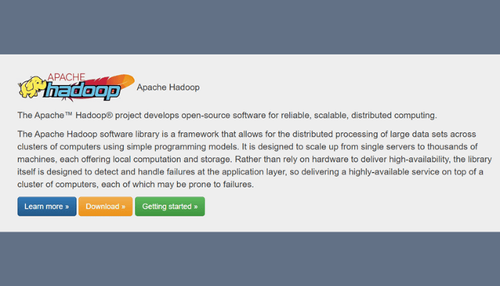
Apache Hadoop is an open-source framework designed for data storing, processing, and analysis across a cluster of computers. As it can scale to handle any amount of data and has fault tolerance, it's commonly used for batch processing, data warehousing, and large-scale data analysis.
👍 Pros:
- Works with a wide variety of data types.
- High-speed processes.
- Large and active community.
- Rich ecosystem of tools and applications.
👎 Cons:
- Some security issues.
- It fails to handle large numbers of small files.
💰 Pricing:
- Open-source and free.
Clearbit: Best Data Enrichment Tool
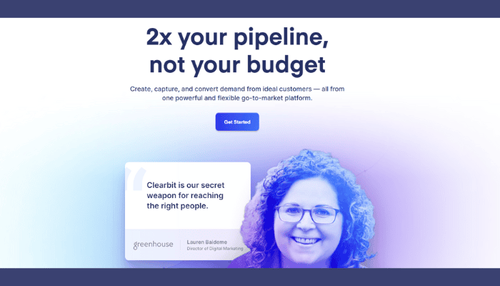
Clearbit is a data enrichment and intelligence platform that provides businesses with the tools to better understand their clients. Its suite of APIs and integrations allows access to customer data collected from public and proprietary sources, validated with machine learning algorithms. It's one of the best big data tools.
👍 Pros:
- Real-time insights and analytics.
- Lead generation.
- It integrates with popular CRM, marketing automation, and sales tools.
- Intuitive layout and navigation.
👎 Cons:
- Outdated and inaccurate information at times.
- Limited customer support.
💰 Pricing:
- Free account creation and API credits.
- Customized pricing plans.
Apache Airflow: Best Data Transformation Tool
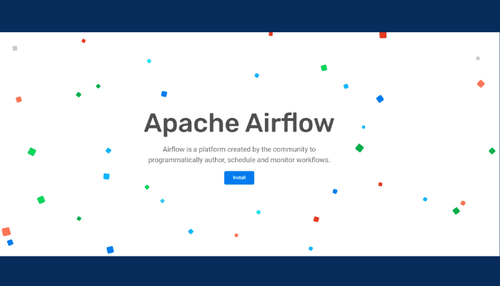
Apache Airflow is a flexible and scalable platform suitable for data transformation. It allows you to define a sequence of tasks as a directed acyclic graph (DAG) using Python to create data pipelines. Airflow also provides sensors to monitor external systems and trigger tasks upon changes.
👍 Pros:
- Flexibility and customization due to its code-based approach.
- Progress monitoring and logging capabilities.
- Extendable modular architecture.
- Seamless integration with third-party tools and services.
👎 Cons:
- Complex setup and deployment.
💰 Pricing:
- Free to use.
Oracle Enterprise Manager: Best Data Query Tool
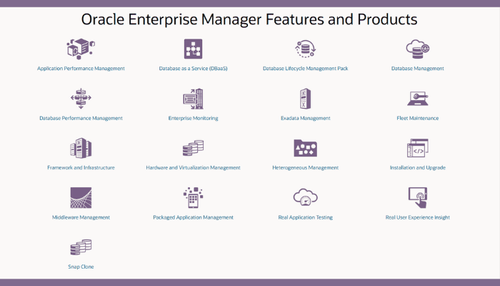
Oracle Enterprise Manager is a web-based tool that provides centralized management and monitoring of Oracle Databases. It has excellent data query and reporting capabilities and allows users to view database performance metrics, manage configurations, and troubleshoot issues.
👍 Pros:
- Automation of routine tasks.
- Customizable dashboards and reports.
- Advanced security features.
- Integration with other Oracle products.
👎 Cons:
- Dependency on Oracle products and limited support for non-Oracle databases.
- Steep learning curve.
💰 Pricing:
- Undisclosed pricing plans.
Conclusion
As you can see, there are many great big data tools and technologies on our list. Which is the one for you depends entirely on your needs, technical knowledge, and budget. However, it's always best to focus on solutions with an intuitive interface, reliable security features, and a good set of integrations.
With that in mind, here are our top three suggestions:
- ZenRows: A powerful web scraping API to get all the necessary data.
- Cloudera: An excellent end-to-end data management tool.
- Clearbit: A data enrichment tool to ensure everything is accurate and up-to-date.
Frequent Questions
Which Tool Is Best for Big Data?
The best tool for big data depends on your project requirements, budget, and priorities. However, here are some reliable options to consider:
- Tableau: The best tool for data visualization.
- CARTO: The most efficient data geospatial tool.
- Apache Hadoop: The only tool you need for data storage.
What Tools Are Used in Big Data?
Many tools are used in big data, and the software market is growing every year. These are the most reliable options:
- ZenRows.
- Tableau.
- Qualtrics CoreXM.
- RapidMiner.
- MongoDB.
- Zoho Analytics.
- Cloudera.
- Adverity.
- Dataddo.
- KNIME.
- Integrate.io.
- TIBCO Clarity.
- Apache Flume.
- CARTO.
- Talend.
- Apache Hadoop.
- Clearbit.
- Apache Airflow.
- Oracle Enterprise Manager.
What Are Some Big Data Tools?
Some of the most used big data tools are as follows:
- ZenRows.
- Adverity.
- Talend.
- Tableau.
- RapidMiner.
- Apache Airflow.
- Cloudera.
- Clearbit.
- Dataddo.
- Apache Hadoop.
Did you find the content helpful? Spread the word and share it on Twitter, or LinkedIn.